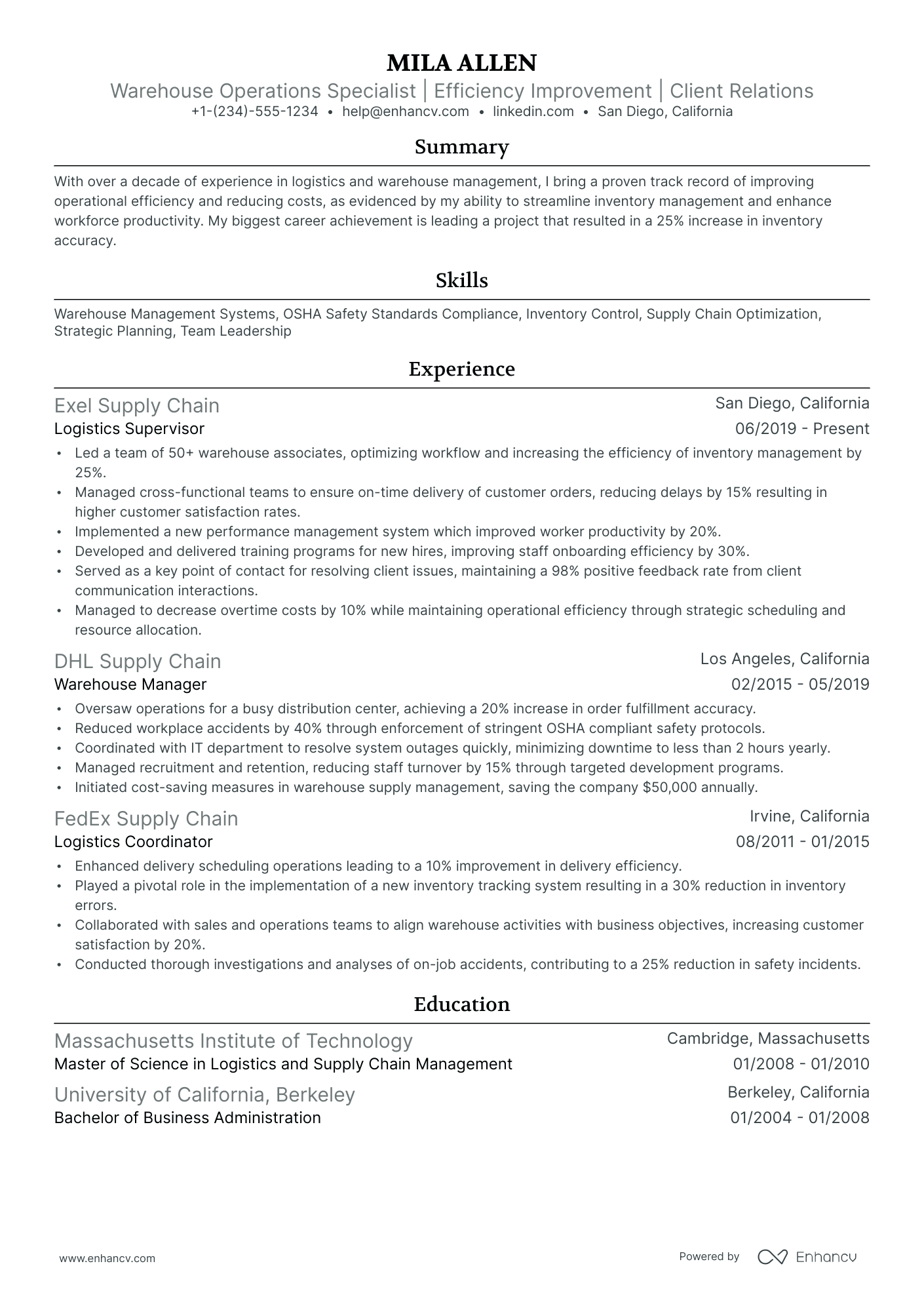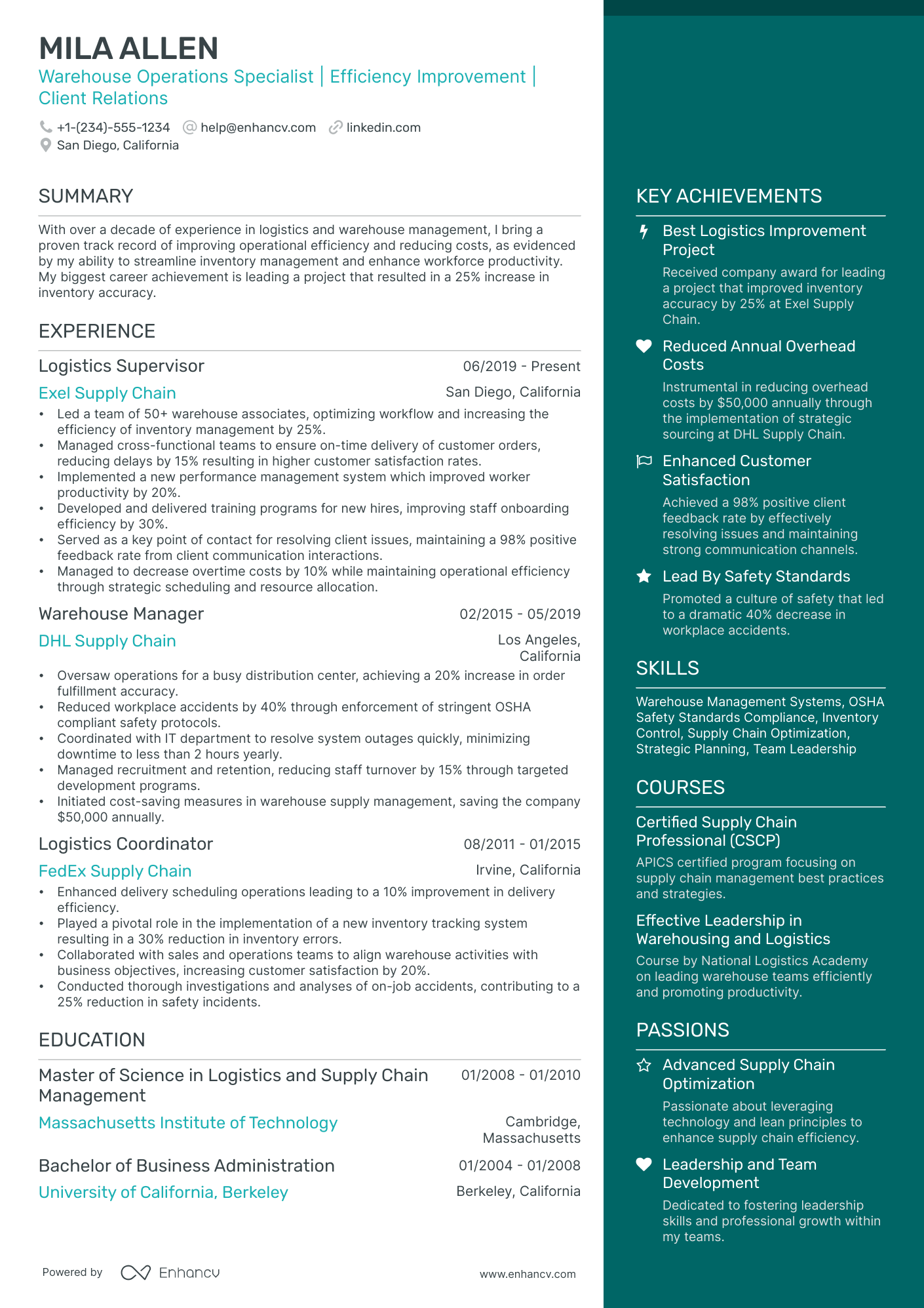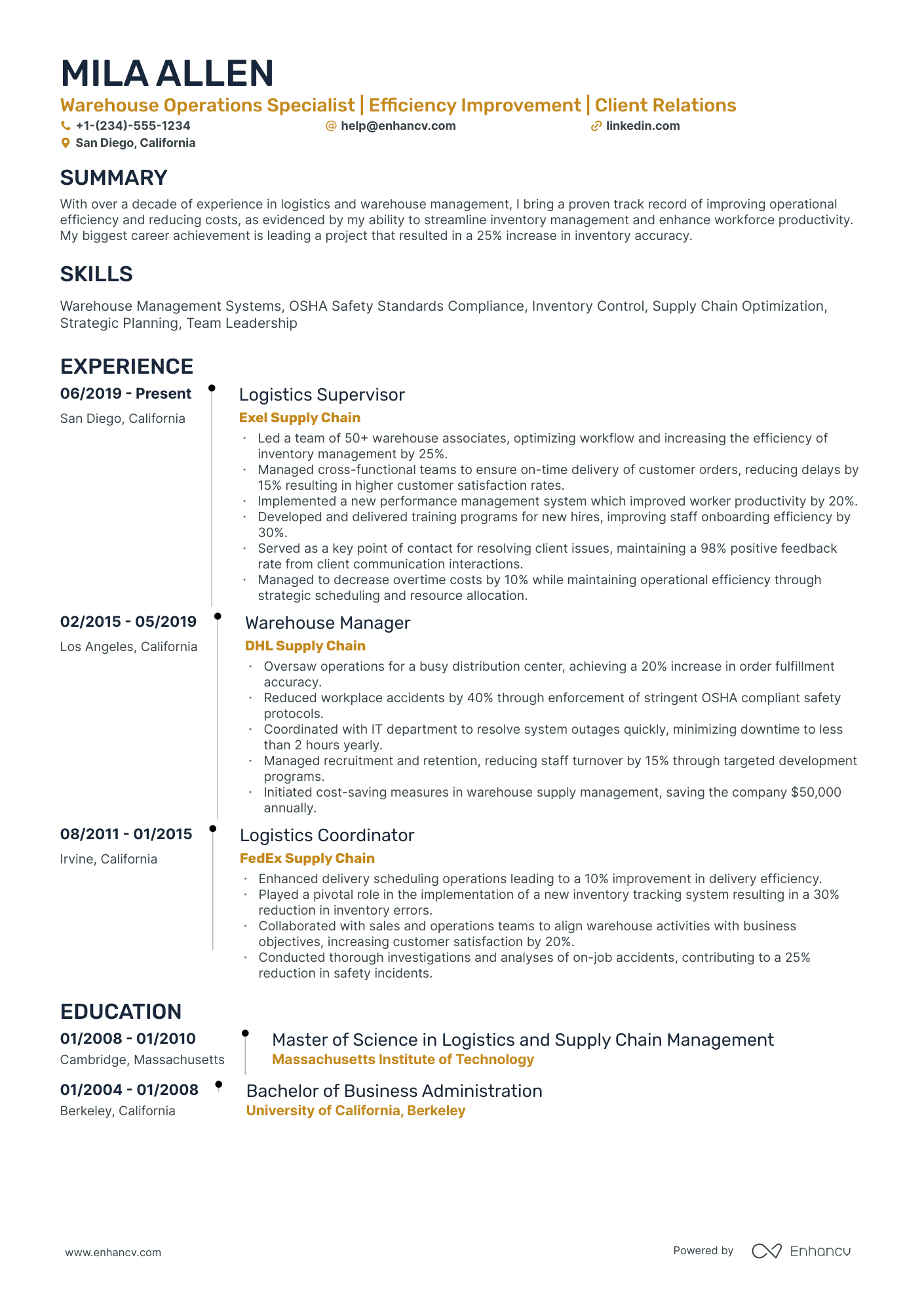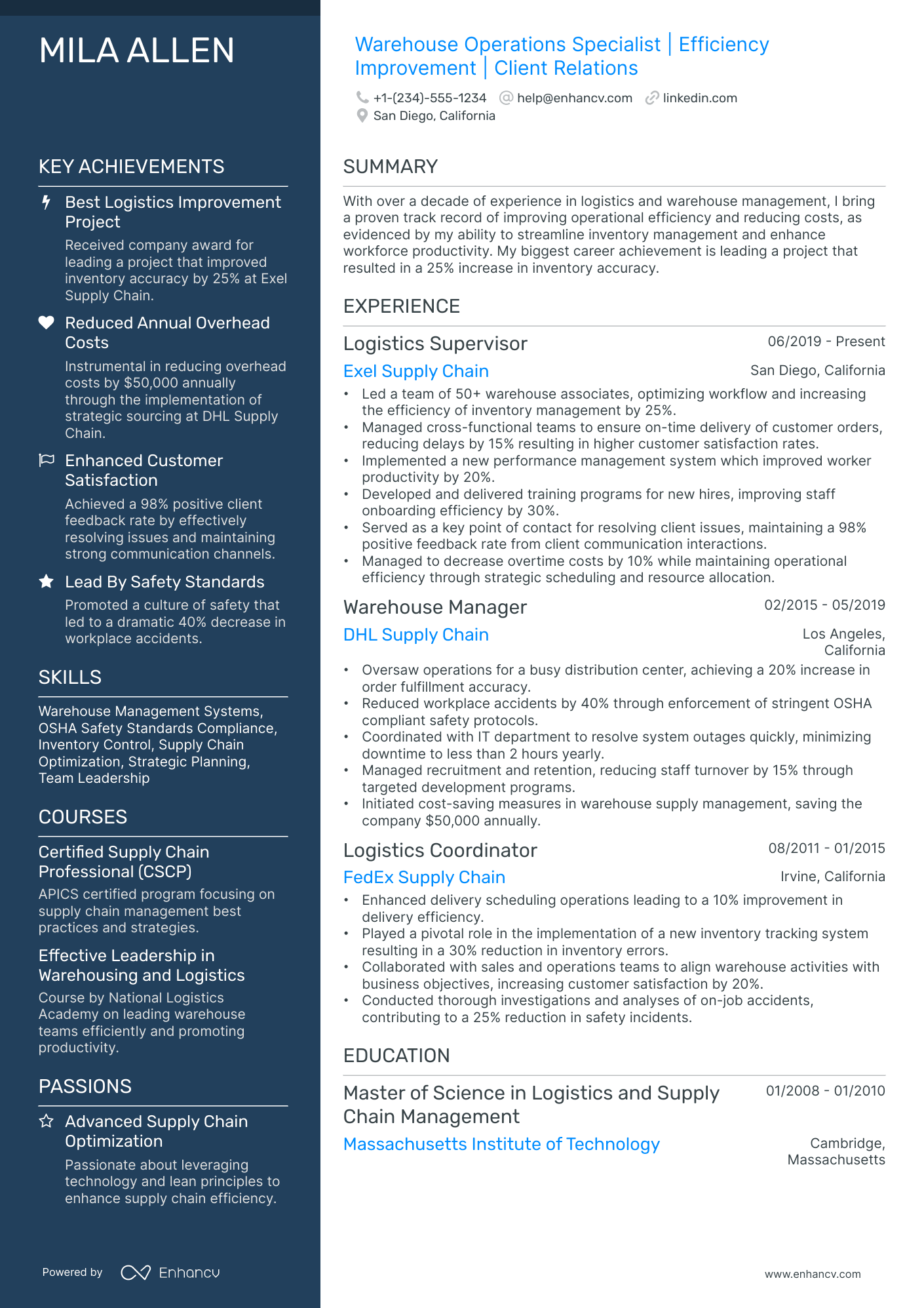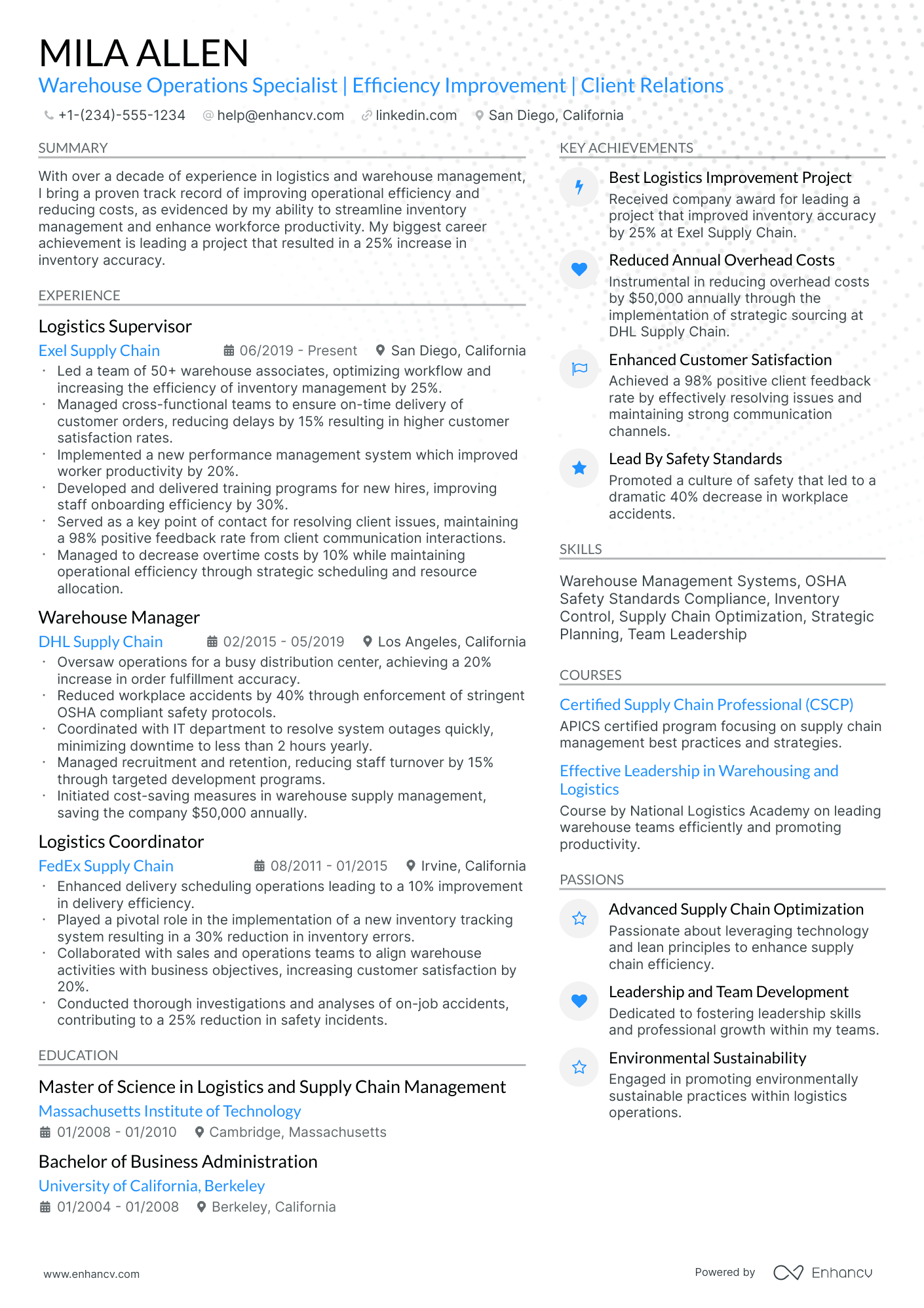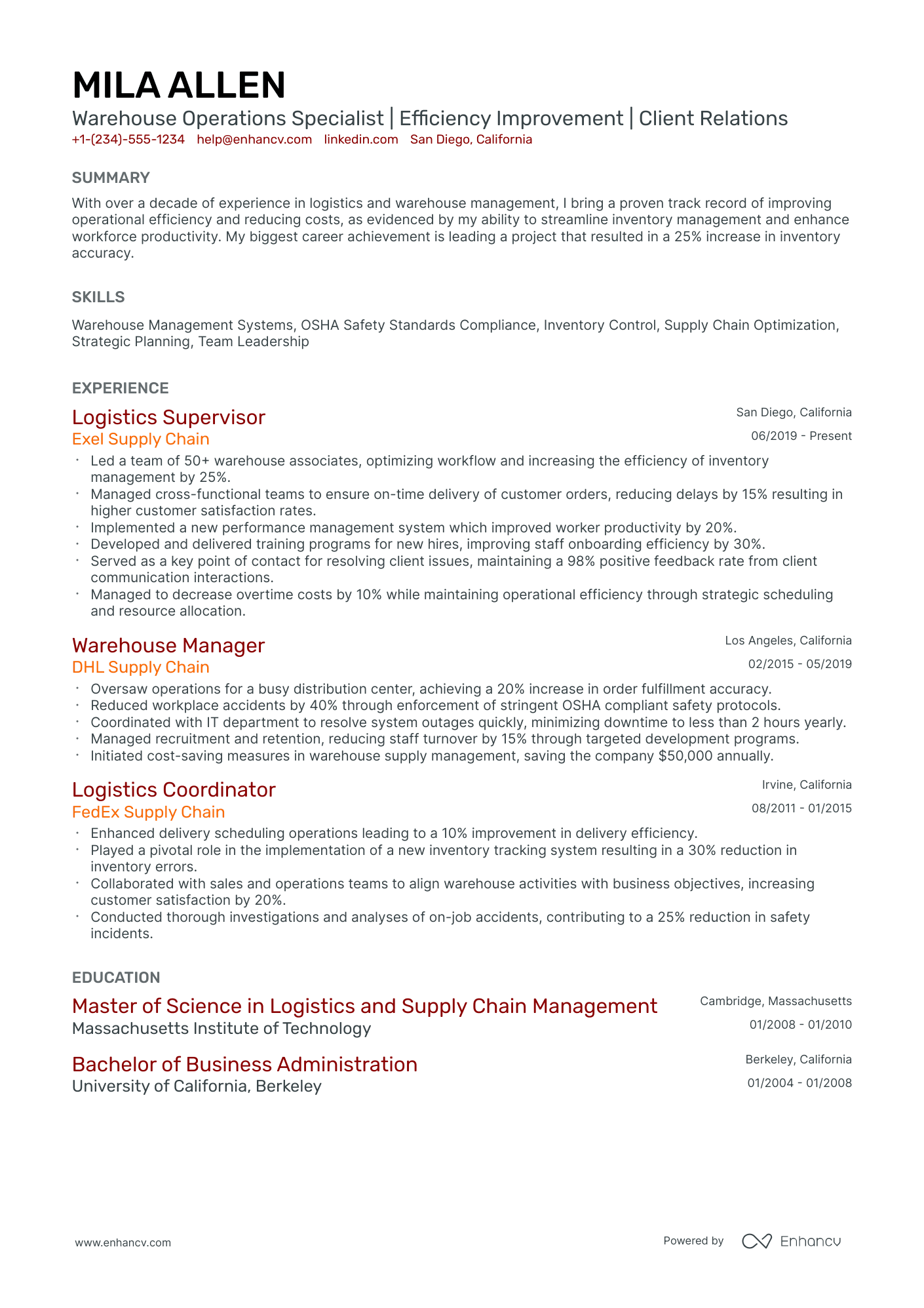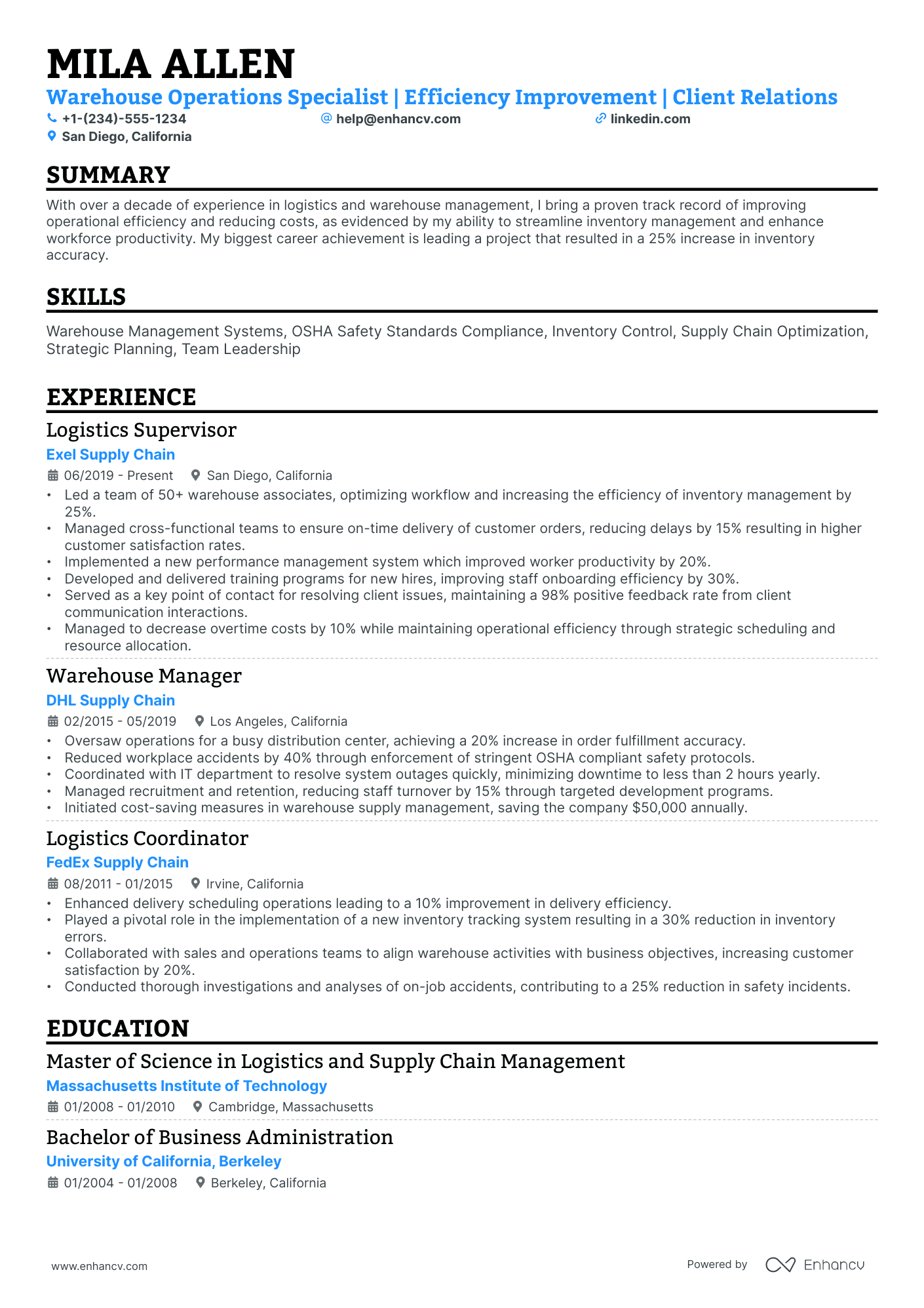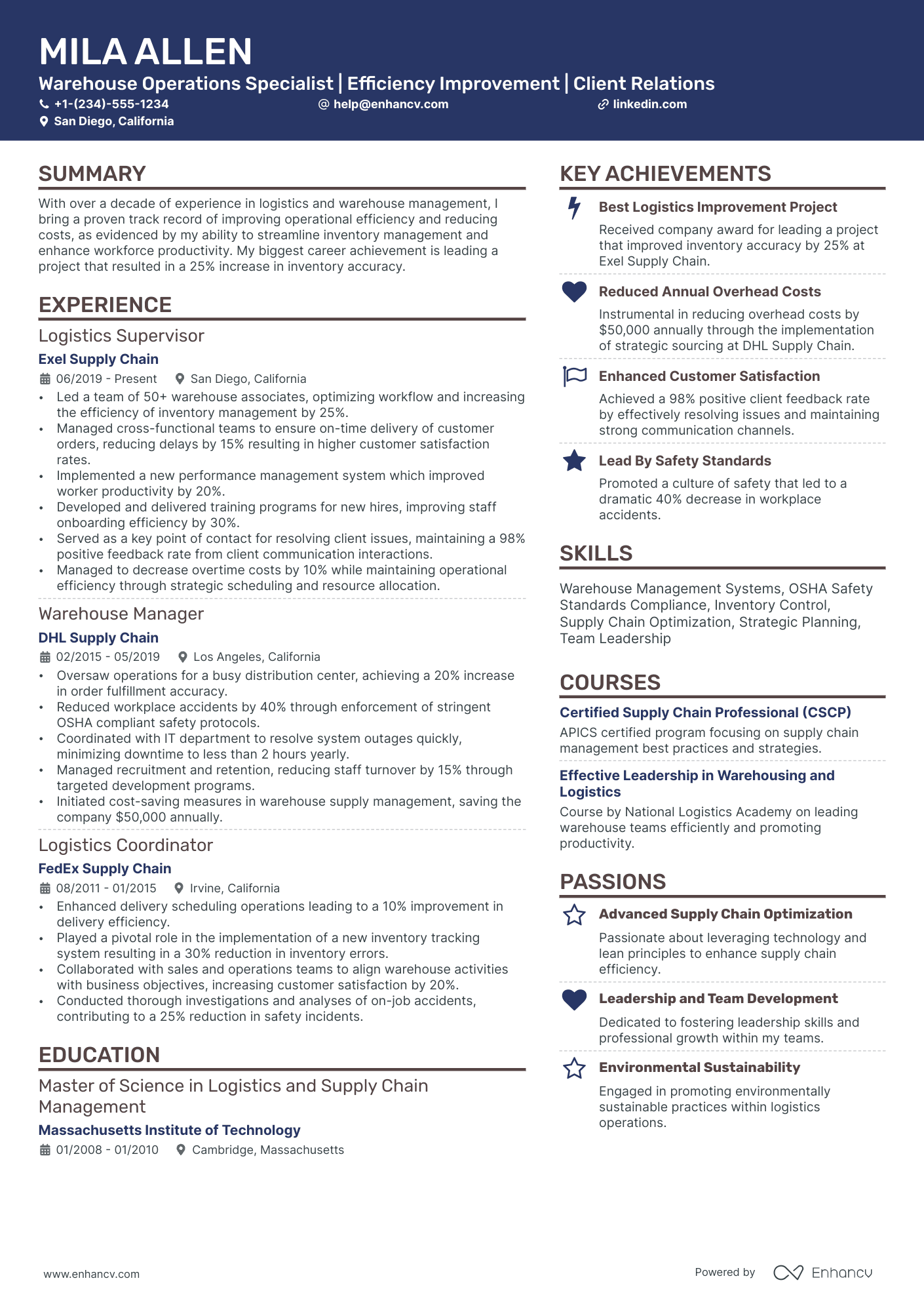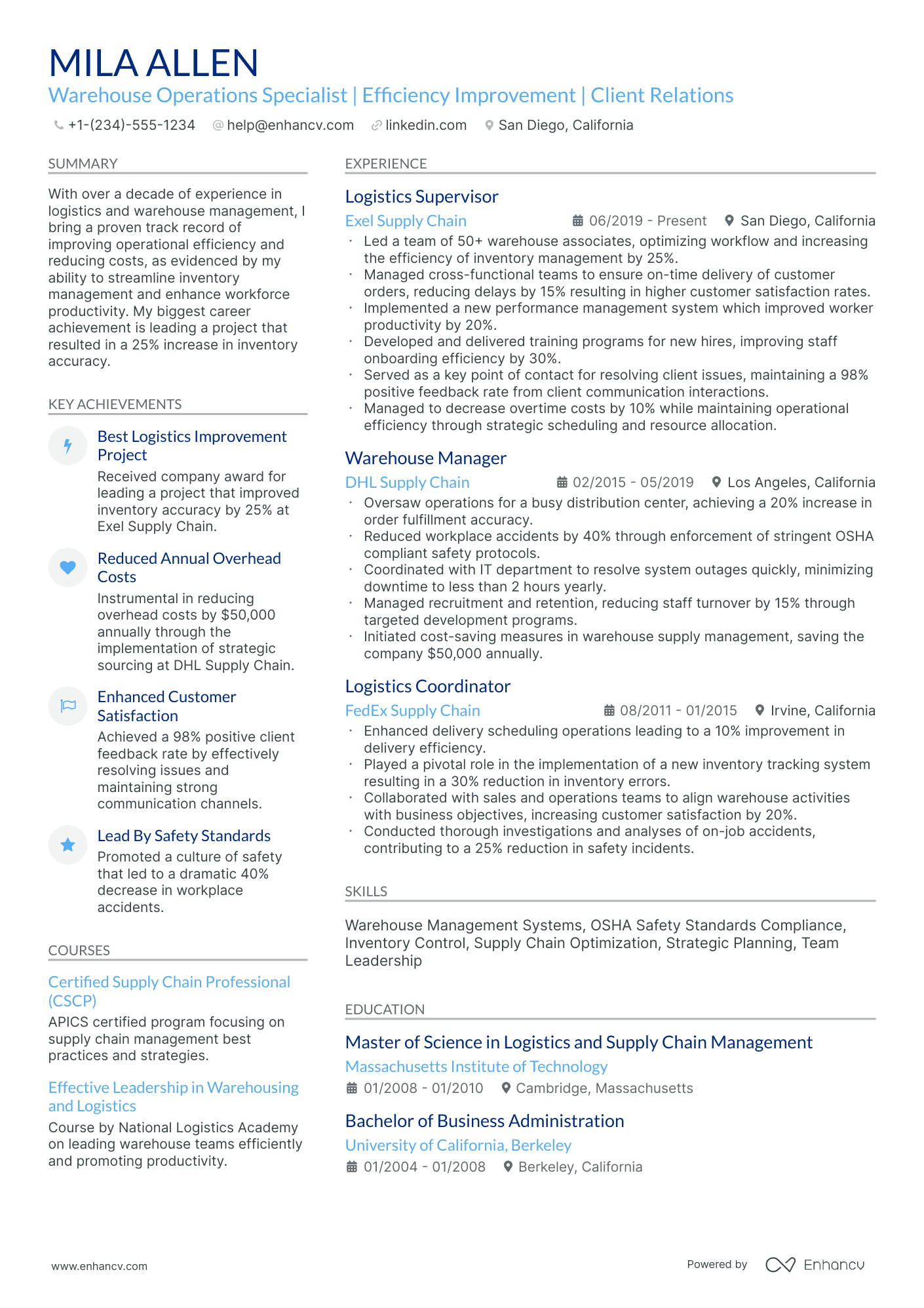As a site manager, tailoring your resume to showcase your unique project management skills and on-site experience can be a significant challenge. Our guide provides you with industry-specific tips and examples to ensure your resume effectively highlights your expertise in site management, setting you apart from the competition.
- Apply best practices from professional resumes to spotlight your application;
- Quantify your professional experience with achievements, career highlights, projects, and more;
- Write an eye-catching site manager resume top one-third with your header, summary/objective, and skills section;
- Fill in the gaps of your experience with extracurricular, education, and more vital resume sections.
We've selected, especially for you, some of our most relevant site manager resume guides. Getting you from thinking about your next career move to landing your dream job.
Designing your site manager resume format to catch recruiters' eyes
Your site manager resume will be assessed on a couple of criteria, one of which is the actual presentation.
Is your resume legible and organized? Does it follow a smooth flow?
Or have you presented recruiters with a chaotic document that includes everything you've ever done in your career?
Unless specified otherwise, there are four best practices to help maintain your resume format consistency.
- The top one third of your site manager resume should definitely include a header, so that recruiters can easily contact you and scan your professional portfolio (or LinkedIn profile).
- Within the experience section, list your most recent (and relevant) role first, followed up with the rest of your career history in a reverse-chronological resume format .
- Always submit your resume as a PDF file to sustain its layout. There are some rare exceptions where companies may ask you to forward your resume in Word or another format.
- If you are applying for a more senior role and have over a decade of applicable work experience (that will impress recruiters), then your site manager resume can be two pages long. Otherwise, your resume shouldn't be longer than a single page.
Align your resume with the market’s standards – Canadian resumes may have unique layout guidelines.
Upload & Check Your Resume
Drop your resume here or choose a file. PDF & DOCX only. Max 2MB file size.
PRO TIP
If you happen to have some basic certificates, don't invest too much of your site manager resume real estate in them. Instead, list them within the skills section or as part of your relevant experience. This way you'd ensure you meet all job requirements while dedicating your certificates to only the most in-demand certification across the industry.
Don't forget to include these six sections on your site manager resume:
- Header and summary for your contact details and to highlight your alignment with the site manager job you're applying for
- Experience section to get into specific technologies you're apt at using and personal skills to deliver successful results
- Skills section to further highlight how your profile matches the job requirements
- Education section to provide your academic background
- Achievements to mention any career highlights that may be impressive, or that you might have missed so far in other resume sections
What recruiters want to see on your resume:
- Proven experience in construction site management and project execution
- Strong leadership abilities and personnel management skills
- Expertise in budgeting, scheduling, and resource allocation
- Knowledge of safety regulations and standards specific to the construction industry
- Excellent communication and stakeholder engagement skills
Adding your relevant experience to your site manager resume
If you're looking for a way to show recruiters that your expertise is credible, look no further than the resume experience section.
Your site manager resume experience can be best curated in a structured, bulleted list detailing the particulars of your career:
- Always integrate metrics of success - what did you actually achieve in the role?
- Scan the site manager advert for your dream role in search of keywords in the job requirements - feature those all through your past/current experience;
- Dedicate a bullet (or two) to spotlight your technical capabilities and how you're able to use the particular software/technology in your day-to-day roles;
- Write simple by including your responsibility, a job advert keyword or skill, and a tangible outcome of your success;
- Use the experience section to also define the unique value of working with you in the form of soft skills, relevant feedback, and the company culture you best thrive in.
Industry leaders always ensure that their resume experience section offers an enticing glimpse at their expertise, while telling a career narrative. Explore these sample site manager resumes on how to best create your resume experience section.
- Oversaw a $25 million construction project, meeting rigorous timelines and staying within 5% of the budget allowances.
- Implemented a comprehensive site safety program, decreasing workplace accidents by 40% over a 3-year period.
- Coordinated cross-functional teams of 50+ to streamline communications resulting in a 15% increase in project efficiency.
- Facilitated the strategic planning and execution of a high-rise condominium project, enhancing the community's landscape and providing 200+ residences.
- Negotiated with vendors to procure high-quality materials at a 10% reduced cost compared to the industry standard.
- Developed a workforce management plan that increased worker productivity by 25%.
- Managed site development for a 300-acre industrial park, which is now home to 10 multinational corporations.
- Led a team of engineers and architects to deliver detailed project reports, ensuring compliance with city and state regulations.
- Automated inventory tracking that reduced material waste by 30% and improved the bottom line.
- Championed the utilization of green building practices in a major commercial project, reducing energy consumption by 20%.
- Cultivated client relationships that resulted in 3 additional large-scale projects worth over $40 million.
- Pioneered a modular construction technique that cut project completion time by 22%.
- Supervised the restoration of a historic landmark, ensuring the preservation of cultural heritage while upgrading to meet modern standards.
- Captured new business opportunities by promoting adaptive reuse initiatives, enhancing profitability by 18%.
- Developed a talent acquisition strategy that improved team expertise and site performance metrics.
- Drove the completion of a large-scale retail complex, attracting major retailers and boosting local employment by creating 600+ jobs.
- Implemented cost-saving measures that reduced project expenditures by 15% without compromising quality.
- Enhanced reporting protocols that provided stakeholders with real-time updates on project milestones and financials.
- Functioned as the lead for a multifaceted urban redevelopment project, delivering mixed-use spaces that revitalized the downtown district.
- Introduced lean construction methods that resulted in a 20% uptick in productivity and a 10% decrease in labor costs.
- Fostered partnerships with local governments to ensure seamless project integration with community infrastructure plans.
- Supervised the technologically advanced construction of a smart office complex, incorporating IoT connectivity for building management systems.
- Coordinated with international teams to align project standards and practices, ensuring the deployment of global best practices in construction.
- Led a comprehensive digital transformation initiative for site management processes, boosting data-driven decision making.
The following content includes information from "O*NET OnLine" by the U.S. Department of Labor, Employment and Training Administration (USDOL/ETA). Used under the CC BY 4.0 license. The data represents the top responsibilities present on the task lists for site manager professionals.
Top Responsibilities for Site Manager:
- Plan, schedule, or coordinate construction project activities to meet deadlines.
- Prepare and submit budget estimates, progress reports, or cost tracking reports.
- Interpret and explain plans and contract terms to representatives of the owner or developer, including administrative staff, workers, or clients.
- Direct and supervise construction or related workers.
- Prepare contracts or negotiate revisions to contractual agreements with architects, consultants, clients, suppliers, or subcontractors.
- Confer with supervisory personnel, owners, contractors, or design professionals to discuss and resolve matters, such as work procedures, complaints, or construction problems.
- Plan, organize, or direct activities concerned with the construction or maintenance of structures, facilities, or systems.
- Study job specifications to determine appropriate construction methods.
- Inspect or review projects to monitor compliance with building and safety codes or other regulations.
- Investigate damage, accidents, or delays at construction sites to ensure that proper construction procedures are being followed.
Quantifying impact on your resume
- Include the scale of projects managed, highlighting the budget size or total project value to demonstrate financial stewardship.
- State the number of direct reports to showcase leadership and team management capabilities.
- Present the percentage of projects delivered on time or ahead of schedule to emphasize reliability and time management.
- Mention the percentage reduction in safety incidents to underline commitment to safety and risk management.
- Quantify any cost savings achieved through efficient site management to illustrate cost-effectiveness.
- List the number of successful bids or contracts won to show competitiveness and business development acumen.
- Specify the improvement in quality scores or audit results to reflect continuous improvement efforts.
- Record the number of training sessions or workshops conducted to display investment in workforce development.
Action verbs for your site manager resume
What if you don't have any experience?
There are two very common scenarios about candidates with less experience. They are either:
- Fresh out of college in search of a site manager role
- Transferring over from a completely different field
Both of these types of candidates still have a shot at landing their first job in the industry.
All they need to do about the experience section of their site manager resume is:
- Consider their strengths - would the outcomes of their previous roles or niche skill sets impress recruiters? Feature those towards the top of your resume
- Exclude any and all irrelevant experience items - remember that at the end of the day, you're telling a story that aims to align with the ideal candidate for the site manager job
- Win recruiters over with personality - perhaps your ambition, dreams, and diligence would make you the perfect fit for the site manager role. Dedicate resume space to detail your personality traits by showcasing how they've helped you succeed in past roles
- Tailor your experience to specific job requirements - ensure your site manager resume answers the advert in the best way possible.
Recommended reads:
PRO TIP
If you happen to have plenty of certificates, select the ones that are most applicable and sought-after across the industry. Organize them by relevance to the role you're applying for.
In-demand hard skills and soft skills for your site manager resume
A vital element for any site manager resume is the presentation of your skill set.
Recruiters always take the time to assess your:
- Technological proficiency or hard skills - which software and technologies can you use and at what level?
- People/personal or soft skills - how apt are you at communicating your ideas across effectively? Are you resilient to change?
The ideal candidate presents the perfect balance of hard skills and soft skills all through the resume, but more particular within a dedicated skills section.
Building your site manager skills section, you should:
- List up to six skills that answer the requirements and are unique to your expertise.
- Include a soft skill (or two) that defines you as a person and professional - perhaps looking back on feedback you've received from previous managers, etc.
- Create up to two skills sections that are organized based on the types of skills you list (e.g. "technical skills", "soft skills", "site manager skills", etc.).
- If you happen to have technical certifications that are vital to the industry and really impressive, include their names within your skills section.
At times, it really is frustrating to think back on all the skills you possess and discover the best way to communicate them across.
We understand this challenge - that's why we've prepared two lists (of hard skills and soft skills) to help you build your next resume, quicker and more efficiently:
Top skills for your site manager resume:
Project Management Software (e.g., MS Project, Primavera)
Budgeting and Cost Control
Quality Assurance and Quality Control
Construction Management Software
Building Codes and Regulations
Site Safety Management
Scheduling Techniques
Contract Management
Risk Management
Blueprint Reading
Leadership
Communication
Problem-Solving
Time Management
Team Collaboration
Decision Making
Conflict Resolution
Adaptability
Negotiation
Attention to Detail
Next, you will find information on the top technologies for site manager professonals from "O*NET OnLine" by the U.S. Department of Labor, Employment and Training Administration (USDOL/ETA). Used under the CC BY 4.0 license.
Top technologies for Site Manager’s resume:
- Database software
- Yardi software
- Dropbox
- Microsoft SharePoint
- HCSS HeavyJob
- Oracle Primavera Enterprise Project Portfolio Management
PRO TIP
Listing your relevant degrees or certificates on your site manager resume is a win-win situation. Not only does it hint at your technical capabilities in the industry, but an array of soft skills, like perseverance, adaptability, and motivation.
Showcase academic background with education and certifications' sections
Listing your education and certifications should be a rudimentary part of your resume writing.
Including your relevant academic background - in the form of your higher education degree and niche-specific certificates - will prove knowledge of the industry.
For your education section:
- Start by including your degree, followed by start and graduation dates, as well as the institution;
- You could include relevant coursework, major/minor , or GPA, only if your've just graduated from college or if this information would further support your application;
- If you have an "ongoing" degree, you can still list it in case you think your diploma can impress recruiters or it's required;
Follow a similar logic for your certifications section by listing the institution, alongside dates you've obtained the certificate. For some of the most recent and relevant industry certificates , check out the next part of our guide:
The top 5 certifications for your site manager resume:
- Certified Construction Manager (CCM) - Construction Management Association of America (CMAA)
- Associate Constructor (AC) - American Institute of Constructors (AIC)
- Certified Professional Constructor (CPC) - American Institute of Constructors (AIC)
- Project Management Professional (PMP) - Project Management Institute (PMI)
- Site Management Safety Training Scheme (SMSTS) - CITB (Construction Industry Training Board)
The content below includes information from "O*NET OnLine" by the U.S. Department of Labor, Employment and Training Administration (USDOL/ETA). Used under the CC BY 4.0 license. The data represents the top associations for site manager professionals.
Top US associations for a Site Manager professional
- Construction Management Association of America
- AACE International
- Accreditation Board for Engineering and Technology
- American Council for Construction Education
- American Institute of Architects
PRO TIP
If you happen to have plenty of certificates, select the ones that are most applicable and sought-after across the industry. Organize them by relevance to the role you're applying for.
Recommended reads:
The summary or objective: focusing on the top one-third of your resume
It's a well-known fact that the top one-third of your site manager resume is the make-it-or-break-it moment of your application. The resume summary and objective could help you further build up your professional profile.
- If you have plenty of career highlights behind your back, use the resume summary . The site manager summary immediately focuses recruiters' attention on what matters most within your experience.
- The resume objective is the perfect choice for balancing your career achievements with your vision. Use it to state precisely how you see yourself in a couple of years' time - as part of the company you're applying for.
Both the resume summary and resume objective can be your value pitch to potential employers: answering what makes your application unique and the top choice for the site manager role. They both have to be specific and tailored - as there's no one-size-fits-all approach to writing your site manager summary or objective. Use the site manager examples below as a starting point:
Resume summaries for a site manager job
- With over 12 years of robust experience in residential construction management, reinforced by a solid background in civil engineering, I have led teams to successfully complete multi-million dollar projects, exceeding client expectations and maintaining strict adherence to safety and regulatory guidelines.
- Accomplished professional equipped with 15 years of experience overseeing commercial development projects, possessing a track record of delivering high-quality work on time and under budget, adept in technology integration, sustainability practices, and cultivating productive contractor relationships.
- Dedicated mechanical engineer transitioning into construction site management, with a deep understanding of project lifecycles and design principles, eager to leverage a decade of experience in project design and coordination to ensure seamless on-site execution and deliver exceptional results.
- Seasoned software project manager aspiring to apply 8 years of team leadership and agile methodology expertise to the construction industry, enthusiastic about bringing a fresh perspective on process optimization and innovative problem-solving to the forefront of physical project management.
- As a recent civil engineering graduate with internships at leading construction firms, I am eager to apply my academic knowledge and hands-on project experience to overseeing site operations, demonstrating a commitment to safety, quality, and team collaboration to achieve project milestones.
- Keen to launch a career in site management, bringing forth vibrant energy and a foundational understanding of construction principles from a recent Building and Construction Technology degree, coupled with exceptional interpersonal skills and a strong desire to learn and contribute to project success.
Optimize your resume summary and objective for ATS
Drop your resume here or choose a file.
PDF & DOCX only. Max 2MB file size.
Average salary info by state in the US for site manager professionals
Local salary info for Site Manager.” Source: My Next Move, National Center for O*NET Development. Accessed 10/15/2024
| State | Average Salary (in USD) |
|---|---|
| US National Average | $104,900 |
| California (CA) | $124,690 |
| Texas (TX) | $98,290 |
| Florida (FL) | $102,940 |
| New York (NY) | $139,370 |
| Pennsylvania (PA) | $104,420 |
| Illinois (IL) | $108,140 |
| Ohio (OH) | $93,050 |
| Georgia (GA) | $99,540 |
| North Carolina (NC) | $101,400 |
| Michigan (MI) | $104,610 |
Other relevant sections for your site manager resume
Apart from the standard site manager resume sections listed in this guide, you have the opportunity to get creative with building your profile. Select additional resume sections that you deem align with the role, department, or company culture. Good choices for your site manager resume include:
- Language skills - always ensure that you have qualified each language you speak according to relevant frameworks;
- Hobbies - you could share more about your favorite books, how you spend your time, etc. ;
- Volunteering - to highlight the causes you care about;
- Awards - for your most prominent site manager professional accolades and achievements.
Make sure that these sections don't take too much away from your experience, but instead build up your site manager professional profile.
Key takeaways
Securing your ideal job starts with crafting a compelling site manager resume. It should not only highlight your professional strengths but also reflect your personality. Key aspects to remember include:
- Choose a clear, easily editable format, allowing more time to focus on the content of your resume;
- Emphasize experience relevant to the job, focusing on your impact on the team;
- Opt for a resume summary if you have extensive professional experience, and a resume objective if you're just starting out;
- Include technical skills in the skills section and interpersonal skills in the achievements section;
- Recognize the importance of various resume sections (e.g., My Time, Projects) in showcasing both your professional abilities and personal traits.
